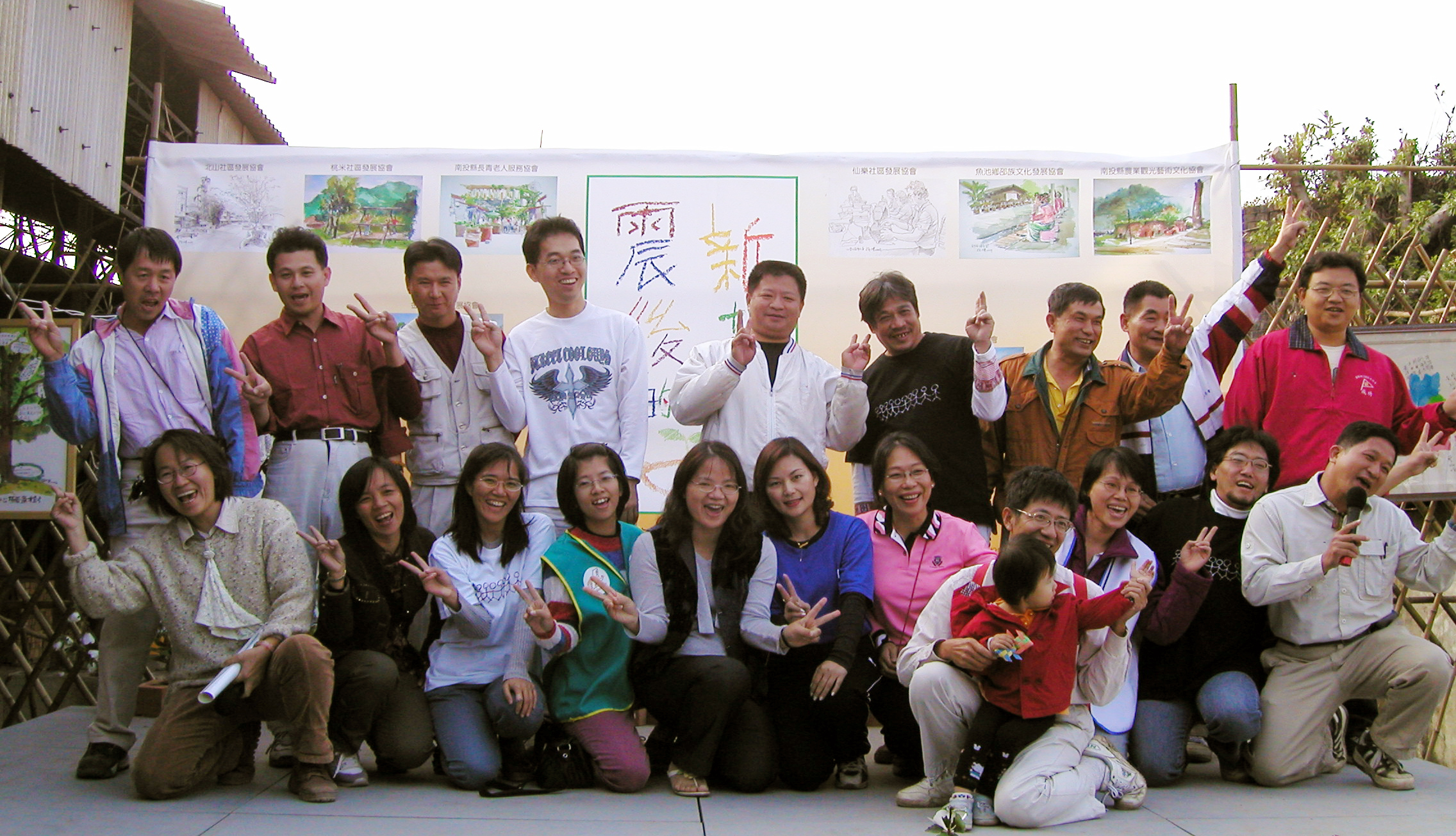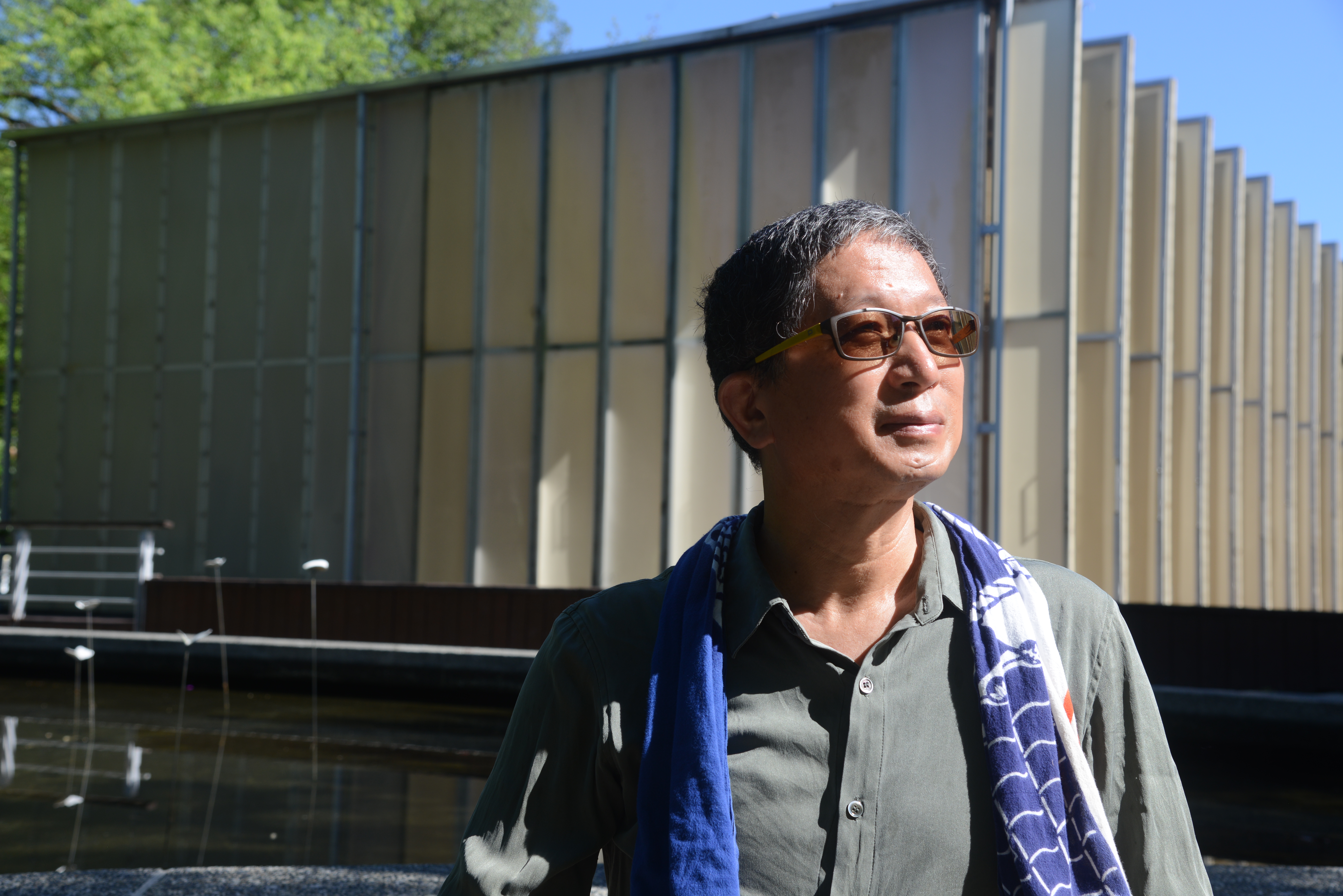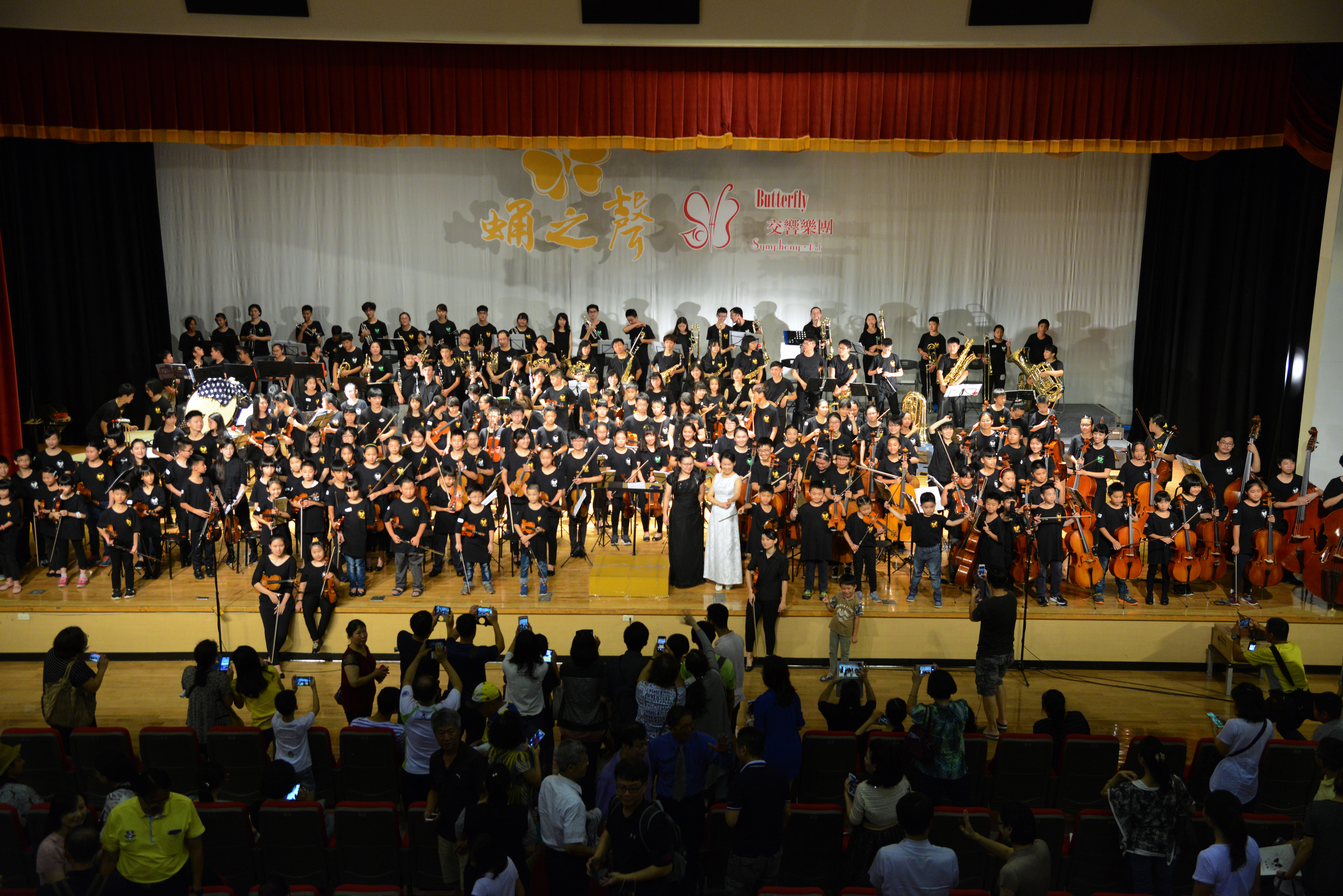|
NewHomeland Foundation (NewHomeland) was established in Puli Township, Nantou County in February 1999. In September of the same year, Puli was severely affected by the Jiji earthquake. The office of NewHomeland turned into a dangerous building. On the next day, the foundation gathered its members at a makeshift office outdoors and began reconstruction efforts. The members entered Taomi Village, originally the poorest village in Puli. From fieldwork to the establishment of industries, NewHomeland helped Taomi transform into an eco-village. It also assisted the village to develop a path towards revitalization based on the principle of "Ecology as substance, industry as means, and culture taking roots". NewHomeland even applied its experience in Taomi Village across all of Puli in an effort to revive Puli's old status as the "kingdom of butterflies". It assembled community development resources to accomplish positive change "from a single village to the entire township" in a decade.
Taiwan and Japan have developed deep bonds of friendship by exchanging their reconstruction experiences after earthquakes. Incidentally, the foundation moved the Paper Dome, a temporary church building constructed using paper tubes, from its original location in Kobe to Puli. With the Paper Dome as a base of operations, NewHomeland linked together the community with a learning center. Later, the foundation even exerted its power as a non-governmental organization (NGO) to establish the Puli Butterfly Symphony Orchestra by integrating resources of local schools. NewHomeland launched a program called El Sistema Puli for underprivileged children who love music. With the program, these children have delivered melodies of hope from Puli to the world and offered comfort to those in need. The actions undertaken by NewHomeland over the years are examples of promoting community transformation based on sustainable development. The foundation combines different industries, such as architecture, environmental conservation, eco-tourism, and performing arts and culture. These methods in turn influence the thoughts and practices of community development in other places of Taiwan. Such accomplishments earned NewHomeland the Community Development Contribution Award in the Ministry of Culture's 1st Community Development Awards in 2022.
Community Practice Developed from Post-Disaster Recovery
Chia-Chan Liao, incumbent Chairperson of the foundation, returned to Puli in 1999, where he founded NewHomeland Foundation with partners in the cultural sector. Liao used to work as a reporter in the media. He recounted that friends his age, who were interested in social issues and involved in social movements after martial law was lifted in Taiwan, started to advocate practice in daily life by taking actions within the community. These efforts climaxed in the 1990s, a milestone crucial to the community development process. Liao said, "Our ideals when working for the community sought to start by making one place better and eventually spreading that seed to a multitude of places across Taiwan, thereby bringing about positive connections and beneficial changes in society." Liao mentioned that his work experience as the CEO of Hsin Kang Foundation of Culture and Education was a key event that inspired him to become a community worker. From his post in Hsin Kang to his role as founder of NewHomeland Foundation, Liao has been continuing his lifelong endeavor through the actions above, with never-changing conviction.
In the early days after NewHomeland was established, cultural and historical surveys on the local community and smaller artistic and cultural activities were organized by the foundation. Liao explained that the purpose was to help local participants better understand their hometown through small activities at that time. By doing so, they could have deeper feelings towards such place and hence build a stronger sense of belonging. The Jiji earthquake turned many people's lives upside down. It occurred just six months after the foundation's establishment. Situated in the hardest hit area, the office of the foundation was badly affected. No one was exempt from the destruction left behind by the natural disaster, resulting in great loss of local people's lives and properties. "Community workers had to face the challenges and dilemmas encountered by the majority of people immediately." NewHomeland built an office outdoors to offer timely assistance for emergency rescue and resettlement, as well as to assemble social resources. For many years to come, the foundation strove to offer constant help in the post-earthquake reconstruction of people's lives, education, and culture. From a process of search and exploration to reinvigoration of industries, the foundation's long-term partnership with the community gave many the chance to open a bright, new chapter in their lives.
Taomi Eco-Village Revitalization Experience
NewHomeland offered assistance in community reconstruction. At the time, the Council for Cultural Affairs had established three community empowerment centers in Nantou County. NewHomeland was responsible for the second center, providing help in the reconstruction of 15 community development locations. Among these was Taomi Village. Liao recalled that locals expressed their concern over Taomi because the village was the poorest in Puli Township at the time. If new industries could not be established to offer job opportunities, people would still leave Taomi, even if collapsed houses were repaired. In the face of the tremendous challenge of reviving industries in the community, Liao noticed that the younger generation in Taomi had strong camaraderie and willingness to work together, maintaining local morale. Later, NewHomeland integrated resources from the Endemic Species Research Institute, Council of Agriculture for local ecological surveys. The surveys found that among the 29 species of Taiwan's native frogs, 23 of them were present in Taomi.

Group photo of NewHomeland Foundation members responsible for the 2nd community empowerment center established by the Council for Cultural Affairs, alongside community empowerment workers. (Image Source: Chia-Chan Liao)
"How do we develop an industry from such newly-found abundance of ecological resources? That question kept constantly spinning in my head." The foundation referenced success stories from other countries and tried to combine environmental conservation with eco-tourism. It trained local residents to become ecological guides and gave them opportunities to learn about B&Bs and catering. These efforts turned in profits under the model of "frogs as business owners". Liao mentioned that according to the records and research in Rebirth from the Quake, edited by Prof. Thung-Hong Lin, the growth rate of Taomi's household income was the highest among all reconstructed communities from 1999 to 2008. From 2008 to 2010, Taomi's household income was either the highest or the second highest in Puli Township. 23 years have elapsed since the earthquake struck the village. Taomi locals' sense of belonging to the village has flipped thoroughly, as they have realized that the core of sustainable development lies in revitalization. Liao added that over the last four years, Taomi Eco-Village Association for Community Development was established jointly by organizations that have offered long-term support to Taomi, including the Association of Taomi Community Development, National Chi Nan University, and NewHomeland Foundation. Problems encountered in Taomi are discussed together at regular monthly meetings of this unofficial association. It serves as a platform to widen connections and facilitate the development of the community.

Ecological guides passionately view their jobs as a mission. They are an important bridge between human beings and nature. (Image Source: Chia-Chan Liao)
From Village to Township: Environmental Conservation and Innovative Development
"Taomi is an important pioneer of community development in Puli Township." In 2010, NewHomeland considered to expand its experience building an eco-village to realize the concept of eco-township. With support from the Ministry of Culture, the foundation hoped to make Puli into the "kingdom of butterflies" again, as people from the 1950s would reminisce. At that time, Puli was an important town for the Japanese to study butterflies. Handicrafts made from the wings of butterflies, processing of specimens, and the external trade of such products flourished. In that page of history, butterflies were an iconic species vital to Puli's prosperity
Over the past decade, the foundation has helped prepare as many as 78 butterfly habitats with nearly 50,000 nectar plants of more than 115 species. "Through the conservation of butterflies, the growing of nectar plants, and arts and crafts projects associated with such imagery, we work with other organizations to strengthen the association between Puli and butterflies. Local elders can relive their memories of butterflies and a new model based on contemporary environmental protection and ecological industries was born." Liao mentioned that NewHomeland has been actively devoted to the conservation of dragonflies in the last two years. It conducts surveys on the habitats of Sympetrum nantouensis—Puli Township and Yuchi Township are the only homes to such species worldwide. With this abundant ecology at the core, the foundation continues to consolidate local resources. Creating a win-win situation and sustainability between human beings and the environment is the bottleneck the foundation constantly attempts to break through.
Moving the Paper Dome for Local Reinvigoration, Founding a Symphony Orchestra to Cultivate Musical Talents
Since the Jiji earthquake hit Puli, NewHomeland has made multiple exchanges of community experience with people from cities struck by earthquakes in Japan. In 2005, the foundation even helped move the Paper Dome, which had completed its mission in Kobe, to Puli, Nantou. Liao hoped that through the moving of the Paper Dome, designed by international architect Shigeru Ban, the building could start a new life in Taiwan as a platform for people to exchange ideas, in addition to serving as a catalyzer for Japan-Taiwan interactions. The foundation looked for space and money to move the Paper Dome. In 2018, at the event Thousands Join to Erect the Pillars, 58 paper pillars were erected in Taomi Village. The event also demonstrated the foundation's courage at establishing the Paper Dome New Homeland Scenic Park and Learning Center. Once in debt, NewHomeland utilized this location as a base to transform itself into a social enterprise. It helped attract visitors to Taomi for tourism and for field work from different domains. The reinauguration of the Paper Dome in Taomi served as a considerable income source that helped the foundation begin independent operations.

Liao's idea endowed the Paper Dome with new life in Taiwan. In addition, with the rebirth of the Paper Dome, the local economy was stimulated and developed, providing support to charitable activities by NGOs. (Image Source: Chia-Chan Liao)
In addition to supporting other activities, the foundation used income from the Paper Dome's operations to found Puli Butterfly Symphony Orchestra in 2013, showing its power as a NGO and providing a stage for local musicians. The orchestra has even performed at other earthquake-struck areas in Japan. Its members transcend the language barrier through the playing and sharing of music and convey borderless love and courage. In 2016, NewHomeland further launched a program for musical talent cultivation called El Sistema Puli. It integrates music resources from the orchestra, National Chi Nan University, and the university's affiliated senior high school to make a world of music accessible to underprivileged children. Most of the big rehearsals and performances of the program were halted during the three years of the COVID-19 pandemic. However, with the restoration of life in the post-pandemic period, the children will soon be able to play music together again.

Puli Butterfly Symphony Orchestra promotes cultural participation with respect for diversity and equal rights. This is a group photo of the orchestra taken after the outcome presentation of its summer camp in 2017. (Image Source: Chia-Chan Liao)
Community Connections and Cohesion for the Creation of Eco-Industries and Local Values
Over the past two decades, NewHomeland has played an important role as a NGO in Puli Township. In Liao's opinion, the social values constantly upheld by the foundation inspire hope in people that perform the work. The accomplishments made in Taomi Eco-Village are a great source of encouragement. "Puli has hope" has become the keynote and vibe when it comes to the future vision of many communities. "It prompts more people to invest effort and work for a better life there. I think this cohesion has sprouted from the undertakings by NewHomeland over the past two decades."

Painting course for seniors in Taomi and Nei Jia Dao Community. The seniors find peace of mind through art. (Image Source: Chia-Chan Liao)
Liao said that, under the existing foundation, NewHomeland has been endeavoring to develop community networks, form associations for ecological guides, and share experience in ecological resources and eco-industries. In recent years, it has even become a major community development partner of National Chi Nan University. Together, they act as a more powerful platform for such actions. This year, with the help of programs related to local revitalization, NewHomeland seeks to apply its long-term approaches and models to eco-industries and talent cultivation. It is hoped that more young people will return to their hometowns and even take over the operation of these activities in the future. Young people may engage in community development to satisfy local needs creatively. Liao added that despite the foundation does not have specific plans yet, the central idea is to leverage the programs mentioned above to stimulate interactions between people inside and outside the communities. If eco-tourism can transform into an industry, diverse tourism models can also be created. Then, local values can be boosted and visitors will be able to better appreciate the beauty of Puli.
About NewHomeland Foundation:
NewHomeland Foundation was established in Puli Township, Nantou County on February 4, 1999. In that time of rapid changes, the foundation waved a flag for community empowerment and aroused underprivileged people's passion and sense of belonging to encourage social participation. After the Jiji earthquake, NewHomeland dedicated itself to the post-disaster recovery. Assisting the construction of an eco-village of frogs in Taomi to an eco-township of butterflies in Puli, the foundation's experience set a valuable precedent for successful local community-government cooperation.
(Interview Editor: Ling-Ying Huang)
Reviewed by: Chia-Chan Liao
Authorization in this article:CC3.0 BY-NC-SA
|








